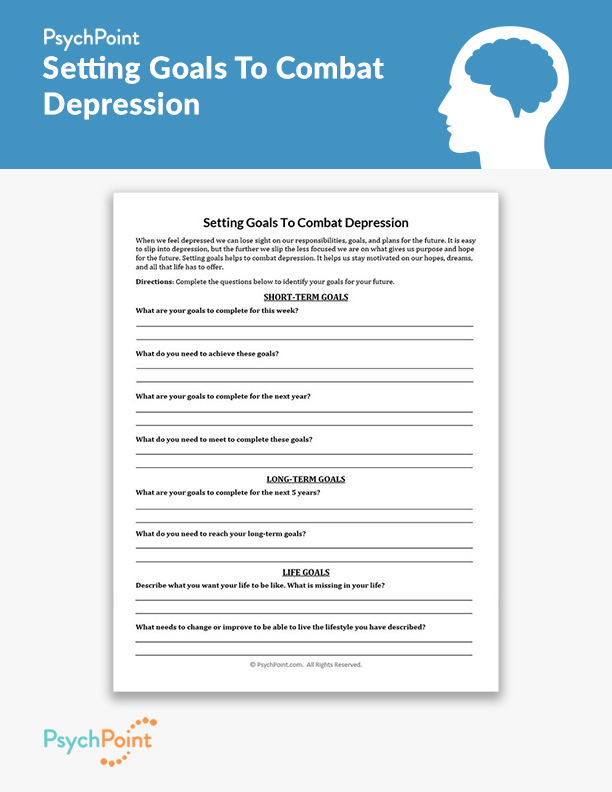Depression goals and objectives? Sounds like an oxymoron, right? Stick with me, because this ain't just another mental health article. Depression is one of those heavyweights in life that can feel like an invisible enemy, but it doesn’t have to define you. Whether you’re someone who’s battling depression or just trying to understand it better, we’re diving deep into the goals and objectives of managing this condition. We’re not just talking about surviving—it’s about thriving, despite the storm.
Depression isn’t just feeling down for a day or two; it’s a serious mental health condition that affects millions globally. According to the World Health Organization, over 264 million people worldwide suffer from depression. That’s a lot of folks carrying a heavy burden, and it’s time we start talking about it openly. This isn’t just about awareness—it’s about action. We’ll explore what depression goals and objectives really mean, how they can transform your life, and practical steps to achieve them.
Before we dive deeper, let’s set the tone: this article is here to empower you. Whether you’re a warrior fighting your own battles or a loved one standing by someone else’s side, we’ve got your back. So grab a coffee, settle in, and let’s break this down together. Depression might be a tough opponent, but with the right mindset and tools, you can turn the tables.
Read also:Mmsdose Com Your Ultimate Guide To Trending Online Content
What Are Depression Goals and Objectives?
Let’s cut straight to the chase: depression goals and objectives are essentially the steps you take to reclaim your life from the clutches of this mental health beast. But what exactly does that mean? Think of it like climbing a mountain—you don’t just wake up at the summit; you plan your route, gather your gear, and take one step at a time. Similarly, depression goals are the milestones you aim for, while objectives are the actionable steps to get there.
For instance, a goal might be “improve my mental well-being,” but the objectives could include things like “attend therapy sessions twice a week,” “practice mindfulness daily,” or even “reach out to a friend once a day.” These small, achievable tasks add up to create significant change over time.
Why Are Goals Important in Managing Depression?
Here’s the deal: depression can make everything feel overwhelming, like you’re stuck in a never-ending fog. But setting goals gives you a sense of direction and purpose. It’s like having a map when you’re lost in the woods. Without clear goals, it’s easy to get sidetracked or feel defeated. Goals help you focus on what truly matters and keep you motivated to move forward, even on the toughest days.
- They provide structure and routine, which are crucial for mental health.
- They give you something to work toward, reducing feelings of helplessness.
- They help you track progress, no matter how small, which boosts confidence.
Breaking Down Depression Goals
Now that we’ve established why goals are important, let’s break them down into categories. Depression goals can vary from person to person, but here are some common ones:
1. Emotional Goals
Emotional goals focus on improving your emotional well-being. This could mean learning to identify and express your feelings more effectively, reducing emotional outbursts, or simply finding joy in everyday moments. Emotional goals often involve therapy, journaling, or practicing self-compassion.
2. Physical Goals
Depression can take a toll on your physical health, so physical goals are just as important. These might include getting regular exercise, eating a balanced diet, or establishing a consistent sleep routine. Remember, your mind and body are deeply connected, so taking care of one benefits the other.
Read also:Unveiling The Mysteries Of Waardenburg Syndrome A Deep Dive With Henning Wehn
3. Social Goals
Social isolation is a common side effect of depression, but reconnecting with others can be a powerful antidote. Social goals might involve reaching out to friends, joining support groups, or volunteering in your community. Building a strong support network can make all the difference.
Setting Realistic Objectives
Alright, so you’ve got your goals figured out. Now it’s time to set objectives. But here’s the catch: they need to be realistic. Setting unattainable objectives is a surefire way to set yourself up for disappointment. Instead, focus on small, achievable tasks that build momentum over time.
For example, if your goal is to exercise more, don’t start by signing up for a marathon. Begin with a 10-minute walk around the block. If your goal is to improve social connections, don’t pressure yourself to attend every social event—start by texting a friend once a week. Baby steps, people.
SMART Objectives: A Game-Changer
Let me introduce you to the SMART framework. It’s a simple but powerful tool for setting effective objectives:
- Specific: Be clear about what you want to achieve.
- Measurable: Make sure you can track progress.
- Achievable: Set objectives that are realistic for your current situation.
- Relevant: Ensure your objectives align with your overall goals.
- Time-bound: Give yourself a deadline to stay motivated.
For instance, instead of saying “I want to feel happier,” a SMART objective might be “I will practice gratitude by writing down three things I’m thankful for every evening for the next month.” See the difference? It’s actionable and achievable.
Common Challenges in Achieving Depression Goals
Let’s be real: achieving depression goals isn’t always a walk in the park. There are bound to be obstacles along the way. Some common challenges include:
1. Lack of Motivation
Depression often zaps your energy and motivation, making it hard to stick to your objectives. Combat this by breaking tasks into smaller chunks and rewarding yourself for progress, no matter how small.
2. Self-Doubt
That pesky inner critic can make you question your abilities. Combat self-doubt by focusing on your strengths and past successes. Keep a journal of positive affirmations to remind yourself of your worth.
3. Relapse
Depression is a journey, not a destination. There will be ups and downs, and that’s okay. If you experience a setback, don’t beat yourself up. Learn from it, adjust your approach, and keep moving forward.
Support Systems: The Secret Weapon
No one said you had to do this alone. Building a strong support system is crucial when working toward depression goals. This could include therapists, support groups, friends, family, or even online communities. Don’t be afraid to lean on others when you need it.
Therapy, in particular, can be a game-changer. Cognitive-behavioral therapy (CBT) and mindfulness-based therapies are especially effective for managing depression. Plus, having a professional in your corner can provide guidance, accountability, and encouragement.
Tracking Progress: Celebrating Small Wins
Tracking your progress is essential for staying motivated. Celebrate every small win, no matter how insignificant it may seem. Did you wake up on time today? Great job! Did you manage to call a friend? High-five! Every step forward is worth acknowledging.
There are plenty of apps and tools to help you track your progress, from mood journals to habit trackers. Find one that works for you and stick with it. Remember, progress isn’t always linear, and that’s okay.
Staying Consistent: The Key to Success
Consistency is the name of the game when it comes to achieving depression goals. It’s not about being perfect; it’s about showing up day after day, even when it’s hard. Build habits that support your objectives, and don’t be afraid to adjust your approach as needed.
One helpful tip is to create a morning routine that sets the tone for the day. This could include meditation, journaling, or even just sipping a cup of tea while reflecting on your intentions. Consistency breeds results, so stick with it.
When to Seek Professional Help
Depression can sometimes feel like a battle you’re fighting alone, but you don’t have to. If you’re struggling to meet your goals or feeling overwhelmed, it’s time to seek professional help. Therapists, counselors, and psychiatrists can provide the support and guidance you need to navigate this journey.
Don’t let stigma or fear hold you back. Reaching out for help is a sign of strength, not weakness. And remember, there’s no shame in taking medication if it’s needed. Mental health is just as important as physical health, and sometimes we need a little extra support.
Conclusion: You’ve Got This
Depression goals and objectives might seem daunting at first, but they’re your ticket to reclaiming your life. Whether you’re working on emotional, physical, or social goals, the key is to take it one step at a time. Celebrate your progress, lean on your support system, and don’t be afraid to ask for help when you need it.
So here’s my call to action: take one small step today. Write down one goal and one objective. Share this article with someone who might benefit from it. And most importantly, be kind to yourself. You’re doing the best you can, and that’s more than enough.
Table of Contents
- What Are Depression Goals and Objectives?
- Why Are Goals Important in Managing Depression?
- Breaking Down Depression Goals
- Setting Realistic Objectives
- Common Challenges in Achieving Depression Goals
- Support Systems: The Secret Weapon
- Tracking Progress: Celebrating Small Wins
- Staying Consistent: The Key to Success
- When to Seek Professional Help
- Conclusion: You’ve Got This



